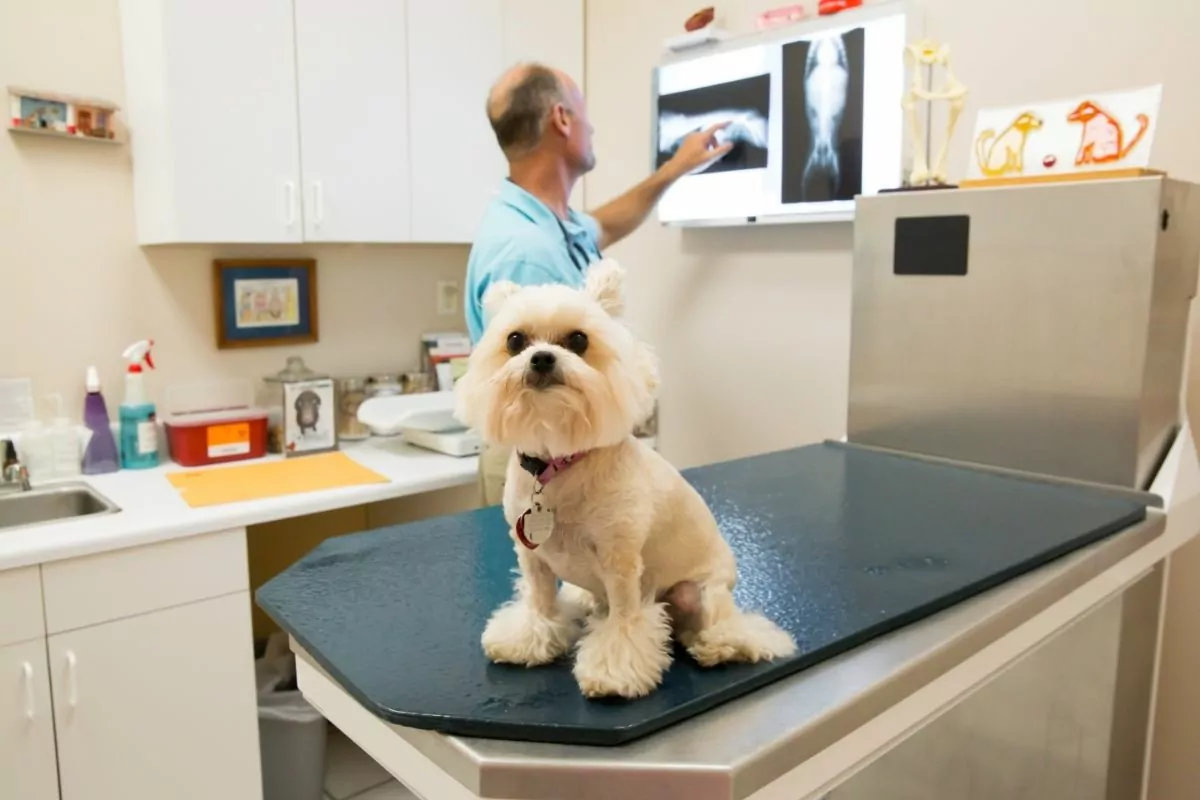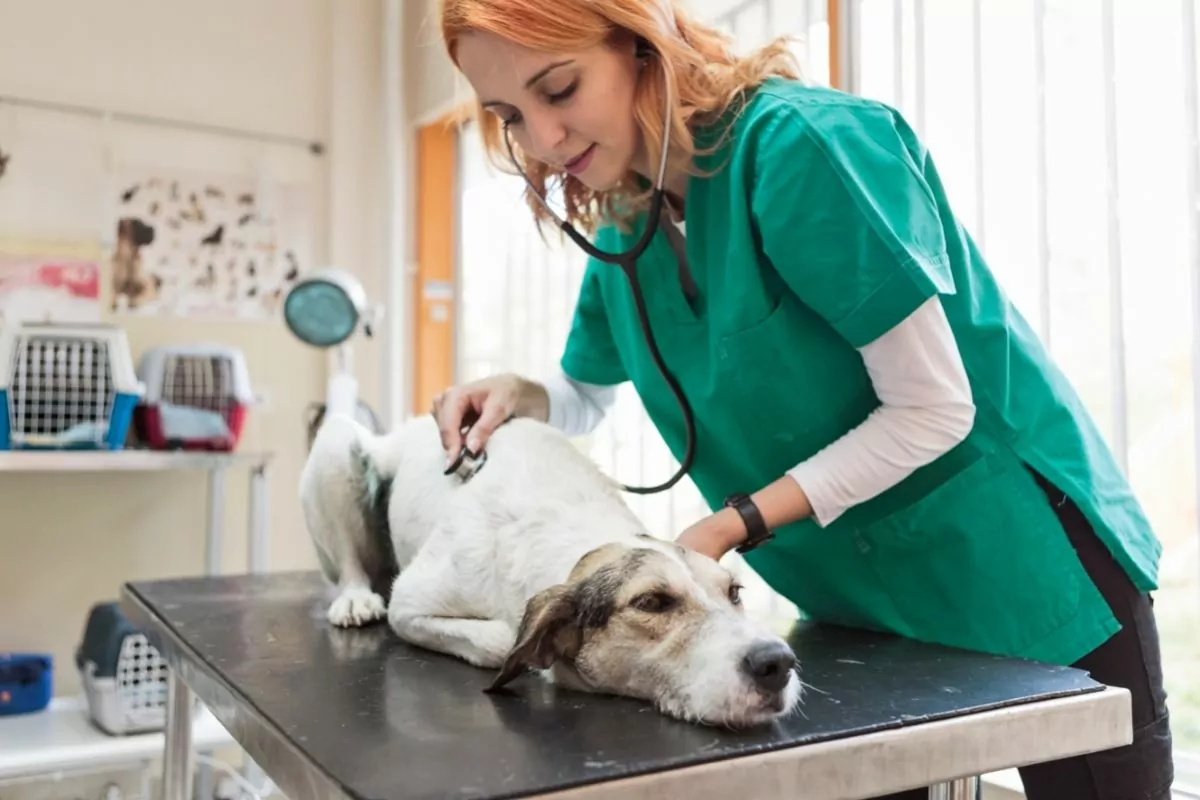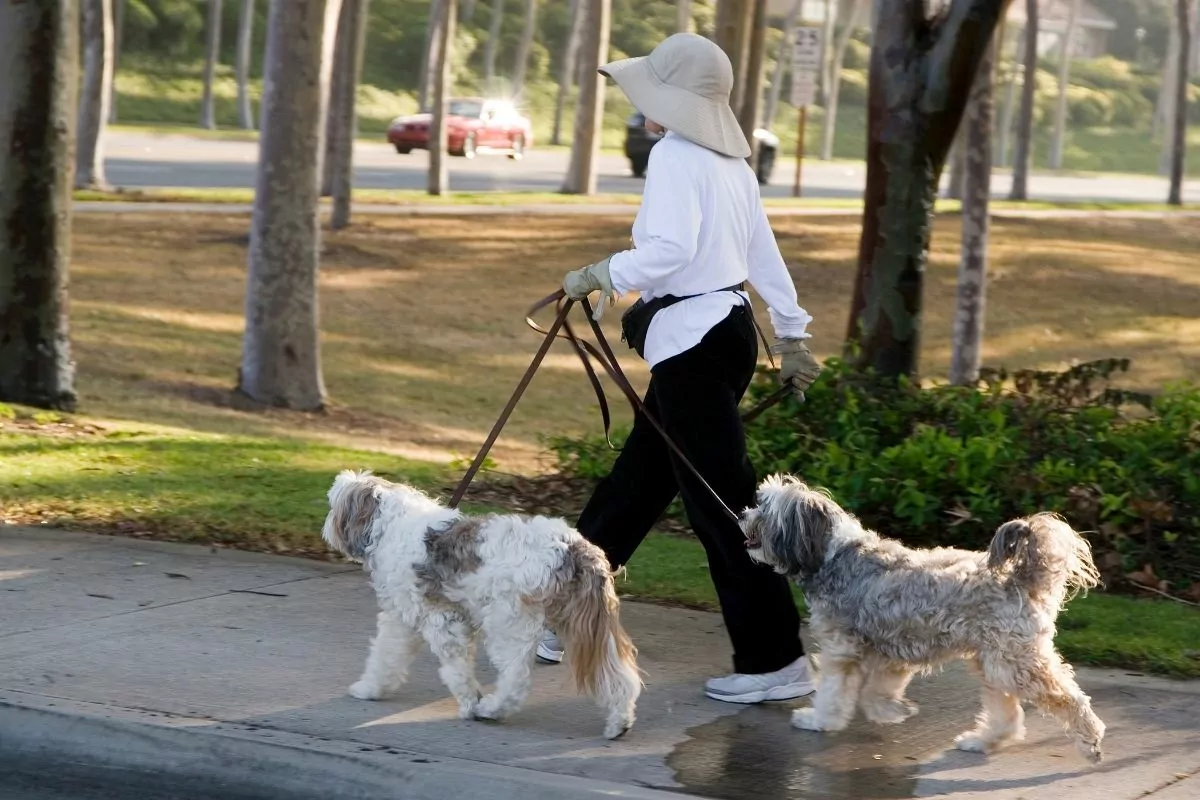Aspiration pneumonia in dogs is a severe condition that can lead to death. If you have a dog, it’s essential to know the signs of aspiration pneumonia and what you can do about it.
It’s imperative to know how this disease affects your pet so you can get them the treatment they need as soon as possible before things get worse.
Let’s take a look at what causes this illness and how you can help prevent it from happening again in the future!

What is Aspiration Pneumonia in Dogs?
Aspiration pneumonia in dogs is a serious condition affecting canines of any size, age, or breed. All it takes for your dog to develop this condition is to inhale foreign material like food, water, or vomit into its airway and lungs.
The bacteria found in the fluid and food make your pup’s already weak lungs vulnerable to infection and disease. This, in turn, can cause serious respiratory problems and other life-threatening complications.
Symptoms of Aspiration Pneumonia in Dogs
Aspiration pneumonia in dogs can be classified by three different types of symptoms, depending on the severity of the disease:
Mild
Mild cases of aspiration pneumonia in dogs only show mild symptoms and complications. Dogs may experience a loss of appetite but still, show normal activity and energy signs. Dogs with mild cases usually recover in a matter of days or weeks without any need for continued treatment.
Moderate
Moderate cases of aspiration pneumonia cause more significant complications. Dogs with this level of disease may also experience inappetence, fever and show signs of respiratory distress.
Some dogs that are diagnosed with this type of pneumonia may even have seizures or go into a coma, which is why it’s so important to get your dog the treatment they need as quickly as possible.
Severe
Dogs with severe cases of aspiration pneumonia can develop severe complications, including respiratory failure and shock. In addition, if your pup has developed this level of disease, it could become extremely sluggish. In these cases, dogs may even fall into a coma or die without proper treatment from a veterinarian.
How do Dogs Get Pneumonia?
Dogs don’t just get colds as humans do. While the common cold can be relatively mild in dogs, dog pneumonia is severe and could lead to death if your pup can’t receive proper treatment.
There are different ways that dogs can develop pneumonia, but the most common methods include:
- Fungus: In rare cases, fungal infections can also cause pneumonia in dogs.
- Allergies: If a dog has a hypersensitivity or an allergy to something they have aspirated or ingested, it can cause an inflammation of the lungs and respiratory tract, leading to pneumonia.
- Viral or Bacterial: Viral and bacterial infections can also cause dog pneumonia, which is why it’s so crucial for your pup to get the proper vaccinations they need to fight off these diseases.
- Parasites: Parasitic infections can sometimes lead to pneumonia, especially if one of the parasites is lungworm.
- Food or water: This is the most common way that dogs can develop pneumonia. When your dog inhales something other than air into its lungs, it can cause an inflammation of the lungs, resulting in pneumonia.
Signs of Aspiration Pneumonia in Dogs?
There are different signs of pneumonia in dogs that can help you know if your pup has been affected by this disease. Keep an eye out for the following symptoms:
- Fever.
- Lethargy or sedentary behavior.
- Labored nose breathing.
- Excessive coughing for no apparent reason.
- Breathing with the mouth open.
- Discharge from the nose or eyes.
- Depression or disinterest in playtime walks or meals.
If your dog shows any of these symptoms, it’s crucial to take them to a veterinarian as soon as possible.
Pneumonia in Puppies
Pneumonia in puppies is more severe than pneumonia in older dogs. This is because puppies aren’t as adept at fighting disease and infection as adult dogs.
Puppies may even experience more severe symptoms than adult dogs that are suffering from pneumonia, which is why it’s so important to take your pup to a veterinarian right away if it’s showing any of the following symptoms:
- Listlessness or lethargy.
- Shivering, especially after exercise.
- Loss of appetite.
- Labored breathing or fast breathing.
How do Vets Diagnose Aspiration Pneumonia in Dogs?
If your dog has been diagnosed with aspiration pneumonia, it will need to be hospitalized and treated immediately by a veterinarian. To properly diagnose this disease, your vet will first need to take a complete history of your dog’s health, including the onset and nature of its symptoms.
Your veterinarian will need to perform a complete physical examination on your dog, including listening to its heart and lungs with a stethoscope.
Your vet will also need to run some tests on your dog, including blood work and X-rays or an ultrasound of its chest.

Are Certain Dog Breeds Predisposed to Aspiration Pneumonia?
Certain breeds of dogs are more likely to develop pneumonia. Dogs with short noses, such as pugs and bulldogs, have a smaller trachea and risk getting food or water down into their lungs. Other breeds that are at a higher risk include:
- Pugs
- Shih Tzus
- Dachshunds
- Boxers
- Cocker spaniels
- Labrador retrievers
- Old English sheepdogs
- Beagles
Treating Aspiration Pneumonia in Dogs
Treatment for pneumonia in dogs depends on the severity of your dog’s symptoms and whether or not it has developed secondary infections.
Your dog will need to spend a few days or weeks at the vet’s office to receive treatment for this disease. Depending on the severity of your dog’s symptoms, it may receive the following treatments:
- Antibiotics (to fight off any bacterial infections)
- Vitamins and other medications (to help boost your dog’s immune system)
- Steroids (to reduce inflammation in the lungs and trachea)
- Intravenous fluids (to help boost your dog’s hydration)
- Chest physiotherapy (to remove mucus or fluid that has built up in your dog’s lungs)
How to Help Your Dog Recover at Home
If you have an older or sick dog that has been diagnosed with pneumonia, it’s essential to keep it comfortable while it receives treatment.
Here are some ways that you can help speed up your dog’s recovery at home:
- Keep your dog in a quiet, warm area of your home.
- Keep visitors and other pets to a minimum around your dog to avoid it getting stressed out or agitated.
- Ensure it gets the proper amount of rest and doesn’t overdo it with exercise.
- Feed it a high-quality diet full of vitamins and minerals to boost its immune system.
- Feeding your dog smaller, more frequent meals makes it easier for it to digest the food.
- Provide plenty of fresh water at all times for your dog to drink.
- Take your dog out for regular walks, but only on a leash, so he doesn’t accidentally wander into a stressful or uncomfortable situation.
- Offer your dog plenty of toys, especially chewable ones, so it doesn’t get bored or stressed out while recovering.
- Be sure that you give your dog its entire course of antibiotics, even if it seems to be feeling better before the treatment is complete.
Is Aspiration Pneumonia in Dogs Contagious?
You might not contract pneumonia from your dog, but bacterial and viral infections can spread quickly between canines.
Suppose you have multiple pets in your home. In that case, it’s vital to separate healthy ones with susceptible immune systems like old or young animals who are sicklier than others of their breed (especially if they share bedding).
To prevent the transmission of dog pneumonia, carefully clean all bedding, bowls, and equipment. Additionally, make careful to thoroughly wash your hands after handling a sick dog for at least 20 seconds each time, or use anti-bacterial soap if necessary, to avoid spreading germs to yourself.
Consider wearing protective garments when going for a stroll so that you don’t bring anything into places where other people might come into contact with what you touched without knowing it’s contagious.
Vaccines are also available for this highly contagious disease in dogs. Make sure to consult with your veterinarian on the best vaccination schedule for your dog.
Preventing Aspiration Pneumonia in Dogs
If your dog suffers from respiratory problems, there are some steps you can take to help keep it safe from getting pneumonia. The following steps will help maintain its respiratory system in good shape:
- Make sure your dog gets plenty of exercise, but avoid activities that require it to run or jump for long periods.
- Avoid playing with your dog near water sources like pools or ponds, which could accidentally inhale water.
- Make sure your dog’s cage or kennel is dry and well ventilated and that there is plenty of room for it to move around.
- Don’t let your dog lick or bite at furniture, food bowls, or other objects in your home.
- Don’t smoke around your dog, and make sure it can get away from any smoke that you do have in your home.

Dog Pneumonia Survival Rates
According to Veterinary Pet Insurance, dog pneumonia survival rates are as follows:
- 80% of dogs with mild, early-stage pneumonia survive.
- 80% of dogs with moderate, early-stage pneumonia survive.
- 50% of dogs with severe, early-stage pneumonia survive.
- Veterinary Pet Insurance’s data also indicated that dogs treated for pneumonia have a 10 % higher survival rate than dogs who are not.
Although the survival rates are low for dogs with pneumonia, there are treatments available that can significantly improve your dog’s chances of living through this disease.
Aspiration pneumonia is a common and sometimes fatal complication of canine aspiration. Therefore, dogs with pneumonia should not be treated as outpatients but rather hospitalized for treatment.
If your dog is constantly coughing or having difficulty breathing, call your vet immediately to help you get them the necessary care to recover from this illness.
